There’s no denying that in today’s internet age, Google remains a goliath. In the US alone, Google Sites had an audience of 238 million unique visitors in 2014, reaching 94% of internet users as the top digital media property.
Despite the company’s continued growth and success, even Google doesn’t expect search’s current supremacy as the gateway to the internet to continue. A few years ago, Google executives predicted that “the end of search as we know it” was on the horizon. Optimistically, they assumed this would be the result of their own innovations, instead of the slow decline of Google’s internet empire.
Search Engine Use is Decreasing
Recent years have revealed a worrisome trend (for Google anyway) — search engine use overall has declined from 90% in 2009 to 86% in 2014. This might not seem like much of a downward trend, but if you consider that overall global internet use has increased by 67 percent in the same period, that’s a lot of internet users who aren’t turning to search.
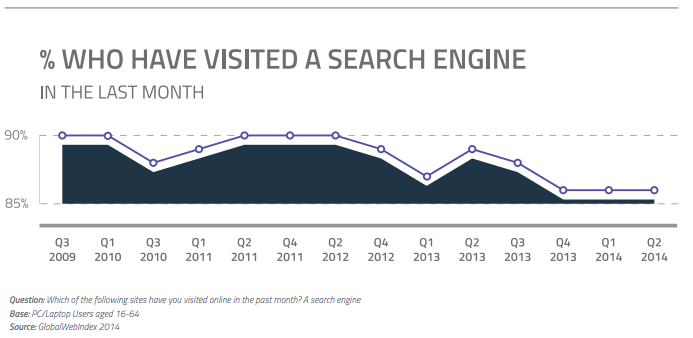
Graph from Global Web Index’s 15 for 15 Report
Even with this decline, people are still managing to find the online resources they need with the help of new tools — namely mobile devices.
Mobile Use Has Skyrocketed
Google became a dominant player in an age where desktops and laptops ruled internet access. Today, there are many more options available to access the internet, such as mobile phones and tablets.
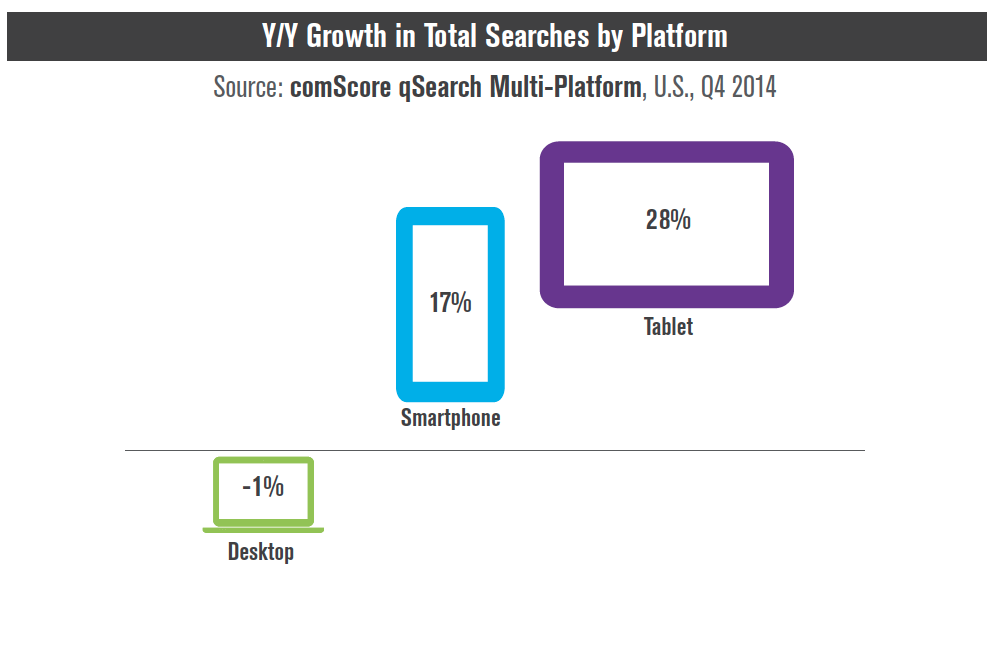
Image from Comscore’s 2015 US Digital Future in Focus Whitepaper
Over the past 4 years, the growth in digital media consumption via mobile has increased 394%, while tablet use has increased 1721%. Desktop use has been on the rise as well, but with a measly 37% growth during the same period.
Part of the reason desktop use isn’t experiencing the same level of growth is that many Americans have limited options for accessing the internet outside of mobile:
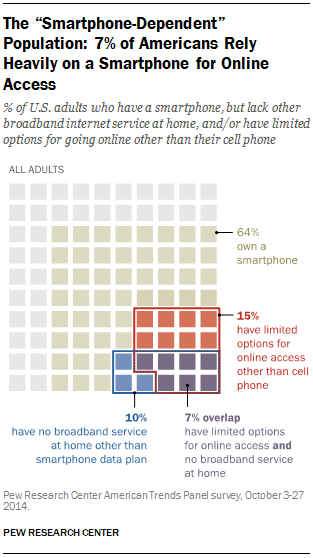
Graph from Pew Research Center
Smartphone dependence is even stronger among millennials — 21 percent of them no longer use desktop computers at all to access the internet.
Still, an increase in mobile use alone doesn’t explain why search would be on the decline. Smartphones and tablets have search capabilities — in fact mobile search accounts for 29% of all search queries.
The answer lies in the unique functionalities of phones and tablets that offer new ways to navigate the internet.
Apps Begin to Eclipse Search Engines
Mobile apps are poised to take over as leaders in internet access.They’re already responsible for 52% of all digital media use.
The trend is a likely explanation for the stark contrast between the rates of Google usage across devices:
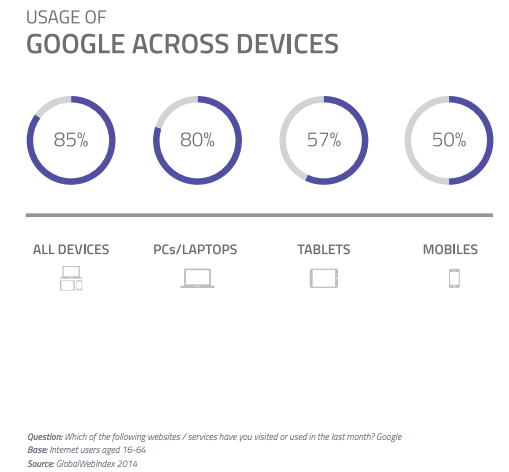
Graph from Global Web Index’s 15 for 15 Report
Google still dominates with 50% reach as an online research channel. However you can see where this is going, especially considering how different the numbers are for Google use by device.
Google’s Fatal Flaw
There’s no denying that Google is the most complex searchable database on the internet. It offers billions of results and is constantly innovating new ways to determine your search needs.
However it would seem that Google’s impressive scope is the very thing that is sending people to apps and other websites to find the information they need.
People want results that are personalized for them, while Google is busy trying to be everything for everyone. There are simply too many relevant results in Google’s database to match the personalization capabilities of apps and websites.
That’s why apps are increasingly being used as research channels, especially among teens, who are 30% more likely to use them for search.
Specialized Online Research Channels
Search engines still take care of the majority of people’s online research needs, but only just. Now, a wide range of review sites, blogs, brand websites, and message boards are allowing users to conduct ultra-specialized searches:
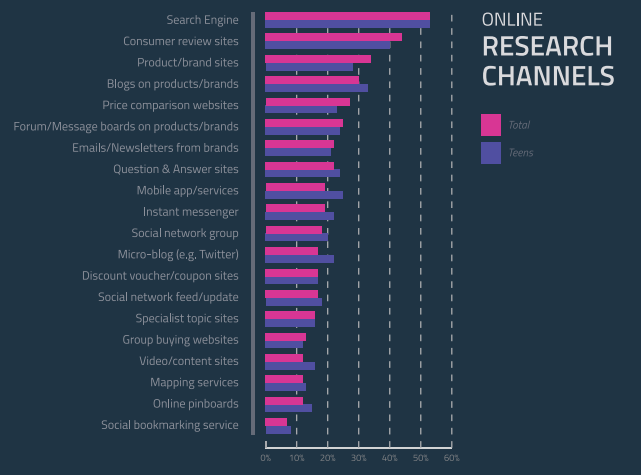
Graph from Global Web Index’s 15 for 15 Report
Many channels are becoming better than Google at understanding exactly the kind of information you’re looking for. Sure, Google has made major strides in customizing local search and leveraging AI to determine a searcher’s needs, but so have others.
Facebook, for example, is deep into AI research, and has a host of data about its users specific likes and interests, allowing it to suggest content, products, news pieces and even local restaurants catered towards the individual user.
Meanwhile Amazon has become a major rival to Google’s product search capabilities, leveraging additional information from websites it’s acquired, such as IMDB and Shelfari, to offer the most relevant search experience.

Screenshot from Amazon
Amazon is also a leader in offering personalized recommendations, while other enterprises may soon be leveraging AI in a similar effort with the help of IBM’s Watson or Oracle’s Datalogix.
As brand websites and online tools are becoming better and better at delivering the content people are looking for, these types of questions will increasingly arise:
Google offers a fairly quick route to these websites on a desktop or laptop, but for someone with the Flickr app on their phone or tablet, the question’s a no-brainer.
On the App = Off of Search
Platforms that can offer a wide variety of personalized content are hoping to meet as many of people’s internet needs as possible, so that they never have to leave the app.
For example, Facebook’s trending topics have created strong competition for news sites (not to mention Google News search) — some 57% of millennials in the US use Facebook for news and information at least once a day, and 14% are doing so almost constantly.

Screen shot from Facebook
Overall, Facebook’s monthly active users are spending an average of 20+ minutes a day on the site, which translates to a whopping 20% of their time spent online.
Twitter is also making efforts to keep users on the app and off the search engines. Twitter Advanced Search allows users to find tweets based on specific words, people, places, dates and other criteria. Considering Twitter’s role in breaking news, there’s no denying that some will find it a better place to get the latest updates than Google News search.
Social platforms are also beginning to adopt features that allow users to make purchases from the app. Relay by Stripe is a new product that allows people to purchase an item at the point of discovery. With this tool, one-click buying is already possible on Twitter.
Grab a new fall read and Downing in English Oak—a go-to pair of sunglasses for any season. Buy now from this tweet! http://t.co/HcDMSVrzJD
— Warby Parker (@WarbyParker) September 14, 2015
Suddenly, there’s no need to leave the app, search for the product on Google, and make a purchase. And it’s only a matter of time before Relay by Stripe or similar services start popping up on other apps.
Is Search Dying as We Know It?
Google has remained the most powerful tool to access digital content almost since its naissance. It would be silly to expect that the most sophisticated online information database, which continues to expand and innovate, is on its way out any time soon.
Google remains the top digital media property in major markets:
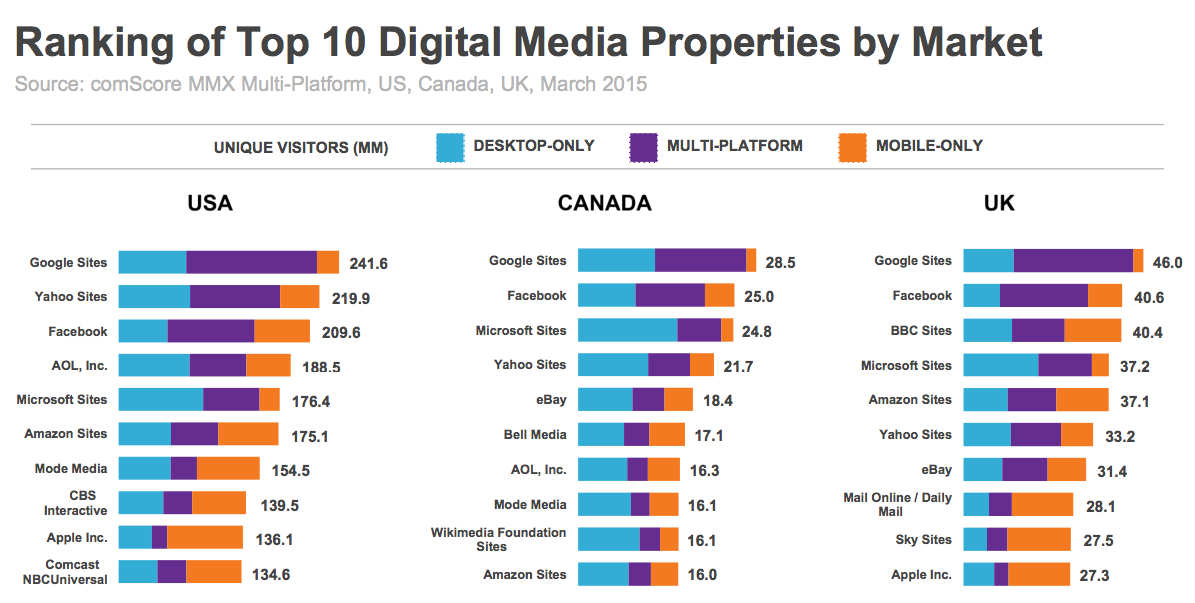
Graph via Comscore’s Global Mobile Report
Still, the incredibly weak showing Google sites has for mobile-only users says something.
The range of channels available on the internet to find information combined with the unique features of mobile devices, suggest that the tides are turning in how people access the internet and find the information they need.
These channels will only become more sophisticated and popular as more people opt for mobile or tablet devices for internet use.
So yes, the death of search as we know it — albeit a slow one — appears to be on the horizon.
The Takeaway
In the long run, brands and businesses focusing the majority of their energy on optimizing for search will face the inevitability of stunted reach and growth.
It’s time for marketers to start thinking creatively about leveraging discovery on a wide variety of channels, or risk the consequences of being lost on a slowly sinking ship.
Need a content writer who can engage your audience?
I’m a freelance writer, providing blogs, articles, e-books, white papers and other marketing materials to help businesses broaden their reach and drive conversions. Email me to discuss your needs and get a custom price quote for my services.
